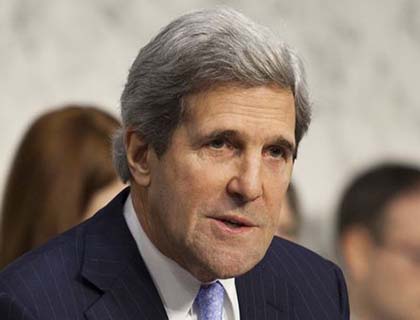KABUL - U.S. Secretary of State John Kerry suggested on Tuesday that the Defense Minister Bismillah Khan Mohammadi could, instead of a reluctant President Hamid Karzai, sign the Bilateral Security Agreement (BSA) that would enable some U.S. troops to stay in the country post-2014.
Last month, the Loya Jirga endorsed the security deal with the U.S., which would ensure a continued military partnership between the two countries long after the NATO combat mission ends next year, but Karzai said he might not sign it until after elections next April.
Karzai rolled-out three new preconditions - transparent elections in April, no raids on Afghan homes and progress in peace talks with the Taliban - for the U.S. to meet if the accord is to be signed by his administration.
Kerry urged the Afghan government to sign the security deal "sooner, not later" and said this priority was backed by all NATO Foreign Ministers taking part in a meeting on Tuesday in Brussels.
"This is not fooling around...This is serious business," Kerry told a news conference in Brussels.
Karzai has received a lot of flack for his recent decision, with many Afghans condemning him for flouting the Jirga and others accusing him of gambling with Afghanistan's future.
U.S. officials have said they need to make plans for any continued troop presence, and for that to happen, the agreement must be finalized. They have said if the pact is unsigned, no troops would remain in Afghanistan and some 4.1 billion USD in aid money would be frozen.
"I think it is important for the agreement to try to move forward," Kerry said. It doesn't have to be the "president," he said, not finishing the word. "You know, his minister of defense can sign it, the government can sign it, somebody can accept responsibility for this," Kerry added.
The National Assembly is required, by law, to vote and approve of the BSA before it is signed. Although that process could take weeks, or months, it is likely the agreement will be ready to be penned long before the April vote.
Assuming that the accord is in many ways more important for Afghanistan than it is anyone else involved, Kerry looked to shift pressure off the U.S. from Karzai's preconditions and back on the Afghans, who ultimately must decide whether to go ahead with the pact.
"But I think it is important, for planning purposes, for people who have been extraordinarily patient, who are trying to allocate major amounts of money to sustaining this effort in Afghanistan, to have knowledge of where they are going."
On Tuesday, the NATO Chief Anders Fogh Rasmussen said on Tuesday that NATO would have to pull all its troops out of Afghanistan by the end of 2014 if Afghan President Karzai does not sign the BSA with the U.S.
"We have pledged to contribute to financing the Afghan security forces. That assistance is put at risk if we can't deploy our own training mission to Afghanistan and furthermore the international community has pledged to provide development assistance to Afghanistan. That aid might also be put at risk. So a lot is at stake and I'm hopeful that the bilateral security agreement between Afghanistan and the United States will be signed and pave the way for a NATO legal framework so that we can deploy a training mission after 2014," Rasmussen said.
He voiced hope Karzai would follow the advice of the Loya Jirga and sign the BSA.
In exclusive interview with TOLOnews, Afghan Presidential spokesman Emal Faizi said that on Tuesday that Rasmussen's comments were nothing new, and that officials in Kabul were well-aware that a continued NATO mission was contingent on what happened with the U.S. deal.
"The remarks of the NATO secretary general with respect to the presence of NATO in Afghanistan aren't anything new, we discussed the matter with NATO officials in our previous meeting," Faizi said. "NATO will make the final decision with regard to its presence in Afghanistan after the BSA is signed."
Meanwhile, Hazrat Omer Zakhailwal, the Finance Minister, said that negotiations over the accord between Kabul and Washington have demonstrated Afghanistan's strength and expressed support for Karzai's uncompromising stance.
"Afghanistan's interests will be best met in these negotiations, there are no obstacles," Zakhailwal said. "I am one of the members of these negotiations, and we talk daily, happily. Obviously, Afghanistan's interest, guided by President Karzai, is for the best."
James Dobbins, U.S. special representative to Afghanistan and Pakistan, traveled to Afghanistan this week.
Although the U.S. Embassy in Kabul described Mr. Dobbins trip as a regular visit, it is said that the focus of his discussions with Afghan officials will be the signing of the security pact between Kabul and Washington.
The NATO-led force currently has around 80,000 troops in Afghanistan, the majority American. NATO is winding down combat operations, handing responsibility to the Afghan security forces, before most foreign combat forces pull out by the end of 2014.
NATO plans to leave a training mission, expected to number 8,000 to 12,000 soldiers, in Afghanistan after 2014. (Tolo News)

